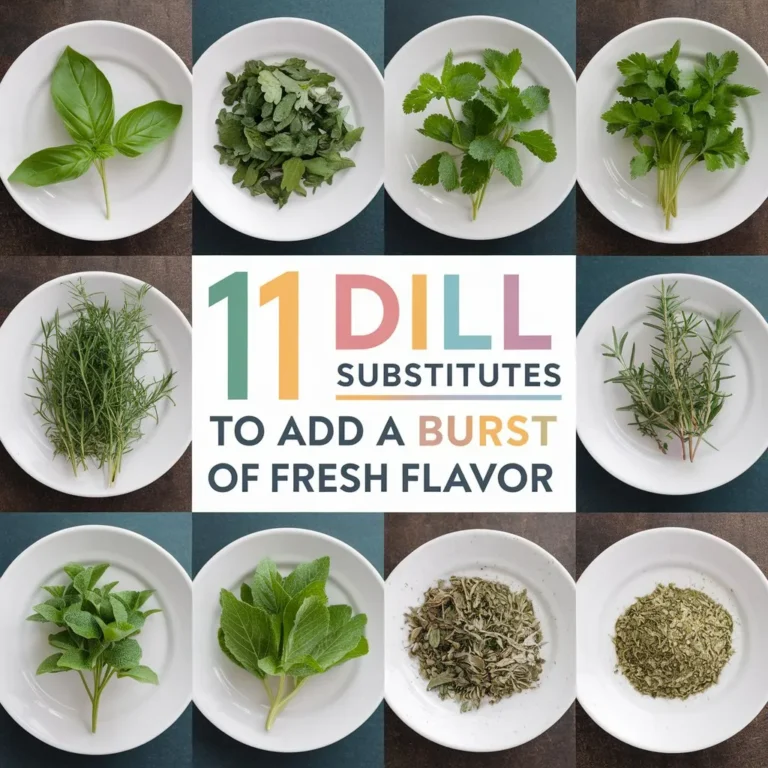11 Red Wine Vinegar Substitutes for a Fruity, Acidic Flavor
When you’re cooking up a storm and red wine vinegar isn’t on hand, don’t let your dish fall flat. You’re likely wondering what alternatives can replicate that fruity, acidic flavor.
The good news is that you have options – 11 to be exact. From fruit-infused vinegars like apple cider and pomegranate to wine-based substitutes and balsamic vinegar, each alternative offers a unique twist.
But which one will work best for your recipe? With so many possibilities, it’s time to explore the world of red wine vinegar substitutes and discover the perfect match for your next culinary creation.
At a Glance
- Apple cider vinegar is a suitable substitute for red wine vinegar in marinades, sauces, and braising liquids due to its similar acidity level.
- Pomegranate vinegar adds a sweet-tart flavor, making it an excellent substitute for red wine vinegar when you want a fruity twist.
- Cranberry vinegar can be used as a 1:1 substitute for red wine vinegar, but may require sugar or honey reduction due to its sweeter taste.
- Elderberry vinegar injects a fruity and lively twist into recipes, offering a unique combination of Elderberry benefits and fruit preservation techniques.
- Balsamic vinegar can substitute for red wine vinegar, introducing a sweeter, more complex flavor profile to your dish, especially when used in a 3:1 ratio.

Apple Cider Vinegar Alternative
When you’re cooking up a storm and realize you’re out of red wine vinegar, you can breathe a sigh of relief – apple cider vinegar is a solid substitute in many recipes.
This fruit-infused vinegar shares a similar acidity level to red wine vinegar, making it an excellent stand-in for marinades, sauces, and braising liquids.
To get the most out of this substitute, try using apple cider vinegar in combination with fruit infusion methods, such as adding sliced apples or berries to the brew.
This will enhance the flavor profile and add a hint of sweetness to balance out the acidity.
When it comes to vinegar brewing techniques, apple cider vinegar is a more forgiving substitute than you might think.
You can use it in a 1:1 ratio with red wine vinegar in most recipes, or experiment with different proportions to find the perfect balance of flavors.
Just be aware that apple cider vinegar has a slightly sweeter and fruitier taste, so you may need to adjust the amount of sugar or spices in your recipe accordingly.
With a little experimentation, you’ll find that apple cider vinegar is a reliable and delicious substitute for red wine vinegar.
White Wine Vinegar Substitute
You’ve got apple cider vinegar down as a reliable substitute for red wine vinegar, but what about white wine vinegar?
This is a vital consideration, especially when you’re working with dishes that require a crisp, dry flavor. White wine vinegar’s acidity levels are generally higher than red wine vinegar’s, so finding a suitable substitute is imperative to avoid throwing off the balance of your recipe.
When it comes to wine flavor profiles, white wine vinegar tends to have a more delicate, citrusy taste, which can be challenging to replicate.
However, you can use a dry white wine or a dry Riesling as a substitute in a pinch. These wines share similar flavor profiles with white wine vinegar, making them a decent stand-in.
Another option is to use a white wine vinegar substitute that’s specifically designed for cooking, which can provide a similar acidity level and flavor profile.
Balsamic Vinegar for Red Wine
Three tablespoons of balsamic vinegar can substitute for one tablespoon of red wine vinegar, but be aware that this swap will introduce a sweeter, more complex flavor profile to your dish.
You’ll notice a deeper, richer taste, which can elevate your recipes. Balsamic vinegar’s sweeter notes come from the slow-cooked grape must used in its production, making it a great addition to dishes where you want a hint of sweetness.
When using balsamic vinegar as a substitute, keep in mind that it’s thicker and more syrupy than red wine vinegar. This makes it perfect for dishes where you want a glaze-like consistency, such as roasted meats or vegetables.
Aged balsamic vinegar, in particular, offers a more nuanced flavor profile, with notes of oak and cherry. Its benefits lie in its ability to add depth and complexity to your dishes without overpowering them. With balsamic vinegar, you can create a balsamic glaze to drizzle over salads, meats, or cheeses, adding a tangy, fruity flavor that’s sure to impress.
Pomegranate Vinegar for Fruit Flavor
One tablespoon of pomegranate vinegar can transform your dishes with its sweet-tart flavor, making it an excellent substitute for red wine vinegar when you want to add a fruity twist.
This fruit-infused vinegar is a game-changer, offering a unique flavor profile that’s both tangy and sweet. You’ll love how it elevates the flavors of your favorite recipes, from marinades to salad dressings.
Pomegranate vinegar is packed with benefits, too. Rich in antioxidants, it’s a healthier alternative to traditional vinegars.
Plus, it’s free from artificial additives and preservatives, making it a great choice for those who prioritize clean eating. When you use pomegranate vinegar, you’re not only adding flavor but also reaping the rewards of this superfood.
In cooking, pomegranate vinegar pairs beautifully with grilled meats, roasted vegetables, and even sweet potatoes. Its fruity flavor adds a delightful twist to traditional dishes, making it an excellent addition to your pantry.
Merlot Wine and Vinegar Mix
Now that you’ve explored the fruity twist of pomegranate vinegar, consider taking a more traditional route with a Merlot wine and vinegar mix.
This blend combines the rich, velvety wine flavor profile of Merlot with the tangy, acidic properties of vinegar.
The result is a complex, nuanced flavor that’s perfect for adding depth to sauces, marinades, and braising liquids.
Merlot wine brings a subtle, fruity flavor with hints of plum, cherry, and blackberry to the mix.
The wine’s tannins add a drying quality, which is balanced by the acidity of the vinegar.
Meanwhile, the vinegar aging process infuses the mixture with a rich, mellow flavor that’s reminiscent of oak and vanilla.
When used in cooking, this Merlot wine and vinegar mix adds a sophisticated, refined quality that’s sure to elevate any dish.
Whether you’re cooking up a hearty beef stew or a simple vinaigrette, this blend is a versatile and flavorful substitute for red wine vinegar.
Blackberry Vinegar for Sweet Flavor
Explore the sweet and tangy world of blackberry vinegar, an invigorating alternative to red wine vinegar that will add a fruity twist to your recipes.
You’ll find that blackberry vinegar’s sweetness is unparalleled, thanks to the ripeness of the berries used in its production.
This sweetness is balanced by a tangy acidity, making it an excellent addition to marinades, salad dressings, and sauces.
When using blackberry vinegar, you’ll notice it adds a depth of flavor that’s hard to replicate with other ingredients.
It’s particularly well-suited for dishes featuring grilled meats, roasted vegetables, or sweet potatoes.
The blackberry sweetness will enhance the natural flavors of these ingredients, while the acidity will cut through richness and add brightness.
In recipes, start by substituting blackberry vinegar for red wine vinegar in a 1:1 ratio.
You can adjust to taste, but this will give you a good starting point.
With its unique flavor profile, blackberry vinegar is sure to become a staple in your pantry, and you’ll find yourself reaching for it again and again to add a fruity, acidic twist to your dishes.
Red Wine Alternative for Vinaigrette
Crafting a vinaigrette without red wine vinegar can be a challenge, but blackberry vinegar‘s sweet-tart flavor profile makes it an excellent substitute.
When you’re looking for a red wine alternative for vinaigrette, blackberry vinegar is a top choice. Its flavor profile is fruity and slightly sweet, with a tangy kick that pairs well with bold greens and rich proteins.
To use blackberry vinegar in your vinaigrette, start with a vinegar ratio of 1:2, meaning one part vinegar to two parts oil. Adjust the ratio to your taste, adding more vinegar for a tangier flavor or more oil for a creamier texture.
Blackberry vinegar’s sweet-tart flavor profile is reminiscent of red wine vinegar, making it an excellent substitute in vinaigrette recipes. By using blackberry vinegar, you’ll add a fruity twist to your vinaigrette without sacrificing the acidity and flavor that red wine vinegar provides.
Cranberry Vinegar for Tangy Taste
Vibrancy bursts forth with the introduction of cranberry vinegar, a tangy titan that electrifies any dish.
You’ll find that this vinegar substitute brings a unique flavor profile that’s both fruity and acidic, making it perfect for salad dressings and marinades. Cranberry juice benefits extend beyond its tart taste, as it’s rich in antioxidants and has anti-inflammatory properties.
When used in flavored salad dressings, cranberry vinegar adds a depth of flavor that complements leafy greens and nuts.
When substituting cranberry vinegar for red wine vinegar, start with a 1:1 ratio and adjust to taste.
You’ll notice that cranberry vinegar is slightly sweeter, so you may want to reduce the amount of sugar or honey in your recipe.
This vinegar pairs well with robust ingredients like grilled meats, roasted vegetables, and strong cheeses.
Don’t be afraid to experiment with cranberry vinegar in your cooking – its bold flavor will elevate even the simplest dishes.
With its tangy taste and numerous health benefits, cranberry vinegar is an excellent addition to your pantry.
Orange Wine and Vinegar Blend
As you venture beyond cranberry vinegar’s tangy domain, you’ll find that orange wine and vinegar blend offers a striking contrast, introducing a subtle citrus nuance that will intrigue your taste buds.
This blend’s unique flavor profile is largely attributed to its wine barrel aging process, which imparts a rich, velvety texture and subtle oak undertones.
The citrus flavor profiles in orange wine and vinegar blend are expertly balanced, evoking notes of fresh orange zest and subtle hints of sweetness.
When used in cooking, this blend adds a bright, uplifting quality to dishes, making it an excellent substitute for red wine vinegar in many recipes.
Its acidity is tempered, making it suitable for delicate flavors that might be overpowered by bolder vinegars.
Whether you’re looking to add a twist to traditional vinaigrettes or elevate the flavor of roasted meats, orange wine and vinegar blend is an inspired choice that’s sure to impress.
Grape Vinegar for Wine Flavor
In pursuit of a red wine vinegar substitute that captures the essence of wine flavor, you’ll find grape vinegar to be an intriguing alternative.
This is because grape vinegar is made from fermented grape varieties, which inherently possess the same flavor profiles as wine. The nuances of grape varieties like Merlot, Cabernet Sauvignon, and Syrah are preserved in the vinegar, offering a complexity that’s hard to replicate with other substitutes.
When you opt for grape vinegar, you can expect a rich, fruity flavor with subtle hints of tannins and a smooth, velvety texture. The acidity level is typically lower than red wine vinegar, but it still packs a punch.
You can use grape vinegar as a 1:1 substitute in most recipes, although you may need to adjust the amount depending on the specific flavor profile you’re aiming for. Remember, the quality of the grape vinegar is vital, so choose a reputable brand that uses high-quality grapes and a traditional fermentation process. With grape vinegar, you’ll be able to add a depth of flavor to your dishes that’s reminiscent of a fine wine.
Elderberry Vinegar for Fruity Zing
While grape vinegar excels at capturing the complexity of wine flavors, you may find yourself seeking a red wine vinegar substitute that injects a fruity and lively twist into your recipes.
Elderberry vinegar is an excellent alternative, offering a unique combination of Elderberry benefits and fruit preservation techniques. This vinegar is made by fermenting elderberries, which are rich in antioxidants and anthocyanins, imparting a deep purple color and robust flavor.
Using elderberry vinegar will add a fruity zing to your dishes, perfect for balancing rich or savory flavors. It’s an excellent choice for marinades, salad dressings, and sauces, where a subtle fruitiness is desired. Additionally, elderberry vinegar’s acidity helps preserve fruits, making it an ideal ingredient for pickling or canning.
When substituting red wine vinegar with elderberry vinegar, start with a 1:1 ratio and adjust to taste, as elderberry can be slightly sweeter. With its distinctive flavor and numerous Elderberry benefits, elderberry vinegar is an inspired choice for adding a fruity and lively twist to your culinary creations.
FAQs
Can I Use Red Wine Vinegar in Cooking for a Non-Alcoholic Dish?
You can definitely use red wine vinegar in non-alcoholic dishes, as its flavor profile is what truly matters, and you’ll find it adds a rich, fruity acidity that elevates your meal, regardless of the absence of wine.
Does Red Wine Vinegar Have Health Benefits Like Regular Red Wine?
You’re wondering if red wine vinegar shares the same health benefits as regular red wine, right? Yes, it does! You’ll still reap antioxidant benefits and heart health benefits, albeit in smaller doses, so go ahead and drizzle it on with confidence!
How Long Does Red Wine Vinegar Last After Opening?
You’ll be relieved to know that, when stored properly in a cool, dark place, your red wine vinegar can last indefinitely, maintaining its flavor and aroma, with a virtually unlimited shelf life, if you follow ideal vinegar storage guidelines.
Is Red Wine Vinegar Gluten-Free for Those With Dietary Restrictions?
You worry about gluten, and rightly so! Red wine vinegar typically doesn’t contain gluten, but you should look for gluten-free certification to verify it’s safe for Celiac sufferers, as some vinegars may use gluten-containing fining agents.
Can I Make My Own Red Wine Vinegar at Home?
You’ll be thrilled to know that, yes, you can create your own red wine vinegar at home through homemade brewing and meticulous vinegar aging, resulting in a uniquely nuanced flavor that’s all yours.

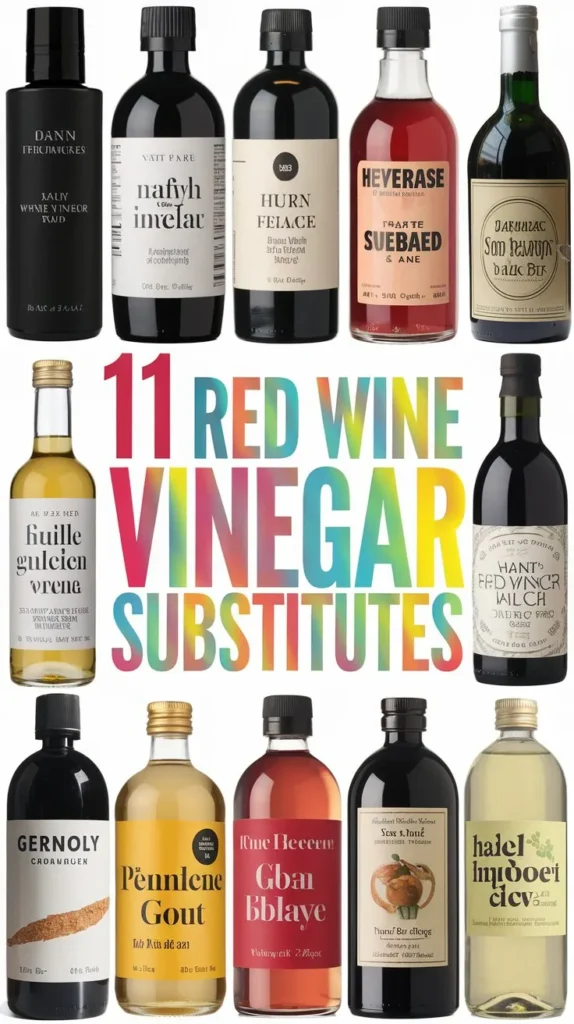
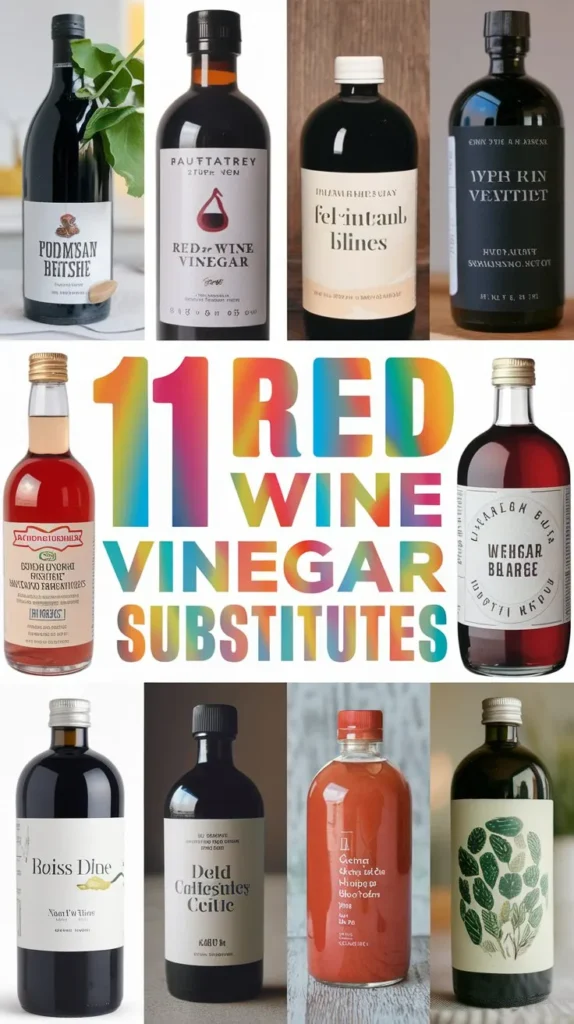

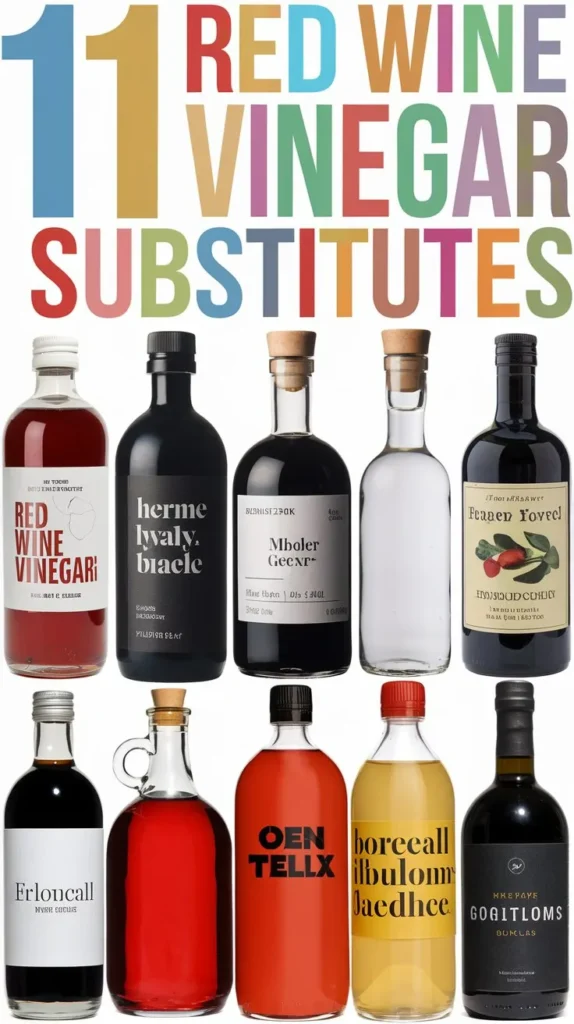
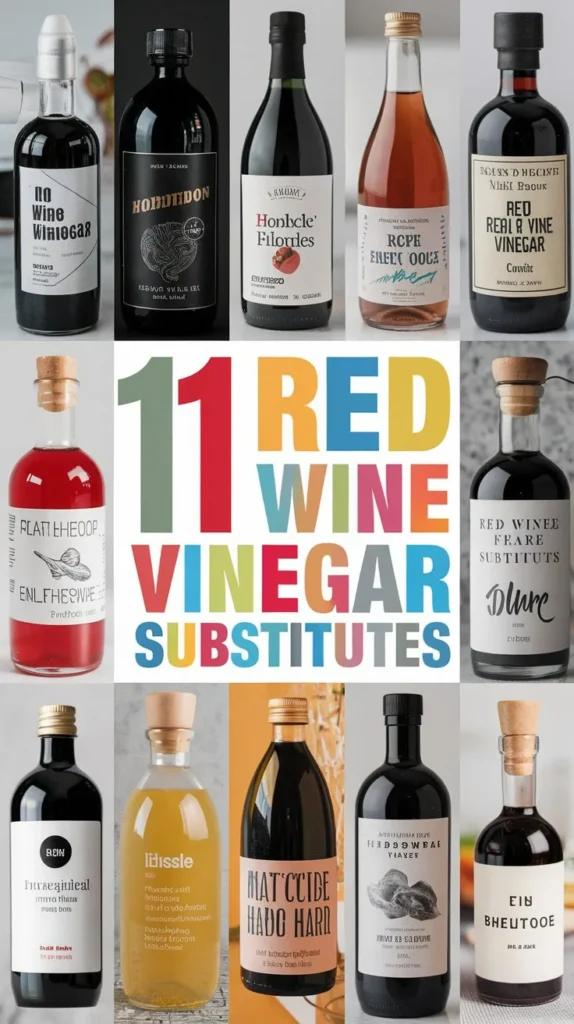


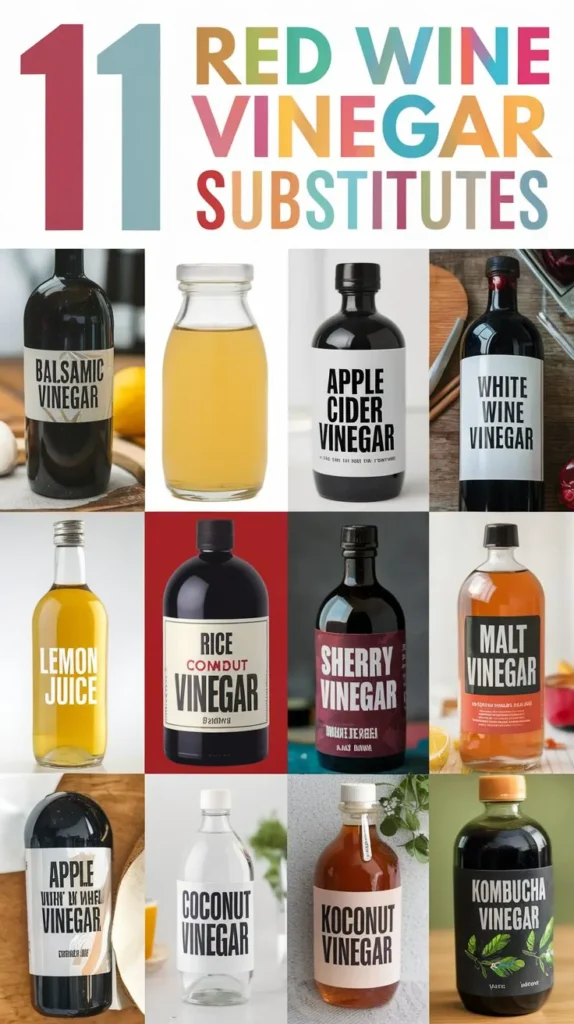

DK Jacks is a passionate food enthusiast, recipe developer, and culinary explorer. With a love for both traditional and innovative flavors, DK brings a fresh perspective to the kitchen. When not experimenting with new ingredients, you’ll find DK capturing food moments through the lens or sharing cooking tips with fellow foodies.🍽️📸✨



